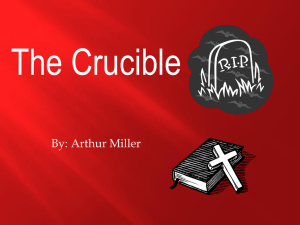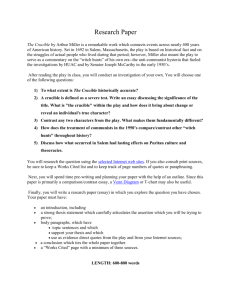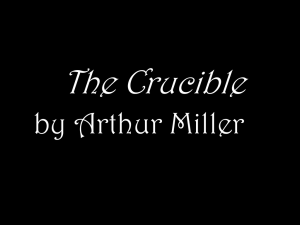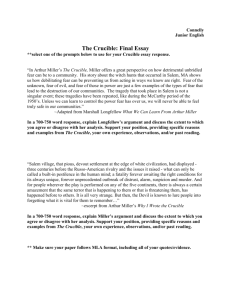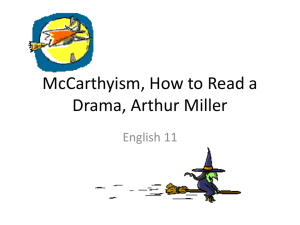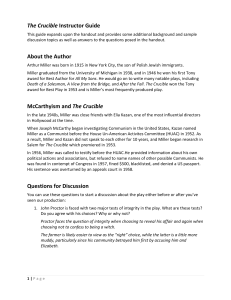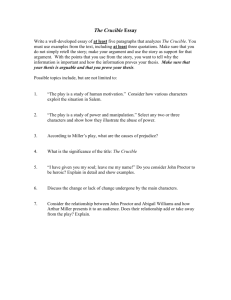Puritanism & The Red Scare
advertisement
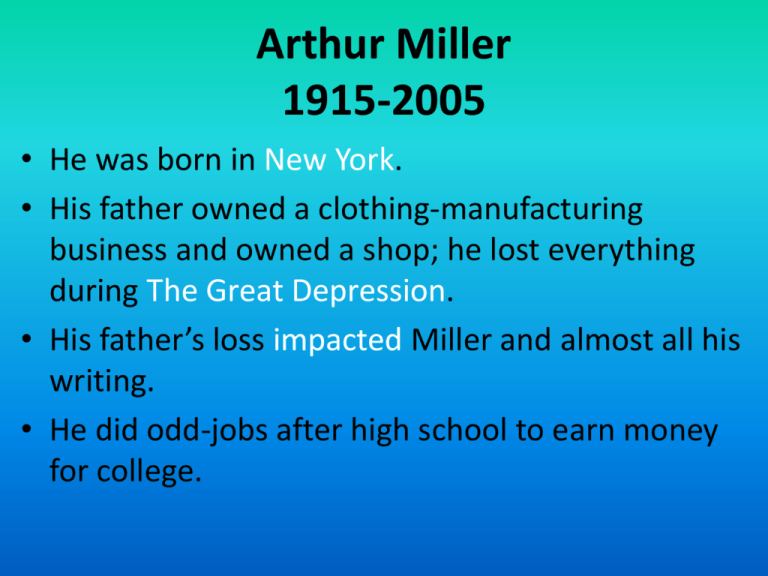
Arthur Miller 1915-2005 • He was born in New York. • His father owned a clothing-manufacturing business and owned a shop; he lost everything during The Great Depression. • His father’s loss impacted Miller and almost all his writing. • He did odd-jobs after high school to earn money for college. Miller . . . He graduated from the University of Michigan with an English degree and a desire to write drama. After several “flops”, he eventually gained fame through several of his plays. Trouble Rears Its Head . . . • In the 1950s, headed by Joseph McCarthy, Congress established the House Un-American Activities Committee (HUAC) in response to the fear of communism (a.k.a. The Red Scare). • The committee was set-up to “investigate” a potential communist conspiracy. • This became known as “McCarthyism” because Senator McCarthy lead the practice of making accusations of disloyalty, subversion, or treason without proper regard for evidence. Trouble Rears Its Head . . . • Many in the entertainment business were targeted: – screenwriters, actors, directors, musicians, and other U.S. entertainment professionals • Once they were under investigation by the HUAC many of these people were blacklisted. • They were denied employment in their field because of their political beliefs or associations, real or suspected. Trouble Rears Its Head . . . • Artists were blacklisted on the basis of one or more of the following reasons. – Alleged membership in or sympathy toward the American Communist Party, – Involvement in liberal or humanitarian political causes that enforcers of the blacklist associated with communism – Refusal to assist investigations into Communist Party activities – Some were blacklisted merely because their names came up at the wrong place and time. Miller Writes The Crucible • The questioning done by the HUAC reminded Miller of the witch hunts in Colonial America, especially after visiting Salem, MA in 1952. • Miller’s friend Elia Kazan had been called before the HUAC and chose to “save” himself by naming names, which included Miller. • Miller immediately proceeded to write The Crucible; its relevance to the current U.S. situation was clear, and after the play was written it caused problems for Miller. Miller’s HUAC Problems • U.S. State Dept. would not renew Miller’s passport to travel to Belgium to view a 1953 production of The Crucible. • Miller was questioned by the HUAC in 1956; he refused to name names and was cited for contempt, fined, sentenced to jail time. • His sentence was overturned in 1958; he never went to jail. The Purpose Behind The Crucible The Crucible was written by Arthur Miller in 1953 as an allegory for McCarthyism or the so called (second) Red Scare. An allegory is an extended metaphor where characters or events represent or symbolize ideas and concepts. Miller felt many personal convictions to McCarthyism as a result of a multitude of events that happened in his life. Wanting to point out to the world the amazing parallel between the unjust Salem Witch Trials of 1692 and the (second) Red Scare from 1948 to 1956, Miller wrote The Crucible to make a powerful statement about the dangers of hysteria and the dehumanization that can result. The Purpose Behind The Crucible He compared the Communist hearings to the witch hunts of Salem, where gossip, rumors, and fear were evidence enough to convict people. The term “witch hunt” now applies to any activity where people are looking for a scapegoat or where they are using accusations to get revenge or to get personal gain or attention. Crucible Definition • The dictionary defines a crucible in the following ways: as a vessel of metal or other material used for heating substances to high temperatures; a hollow area at the bottom of a furnace in which liquid metal collects; or any severe or searching test. A crucible has great forces applied to it, and its contents often are melted, changed, or destroyed. • Why do you think Arthur Miller chose to name his play about the Salem Witch Trials, The Crucible?
